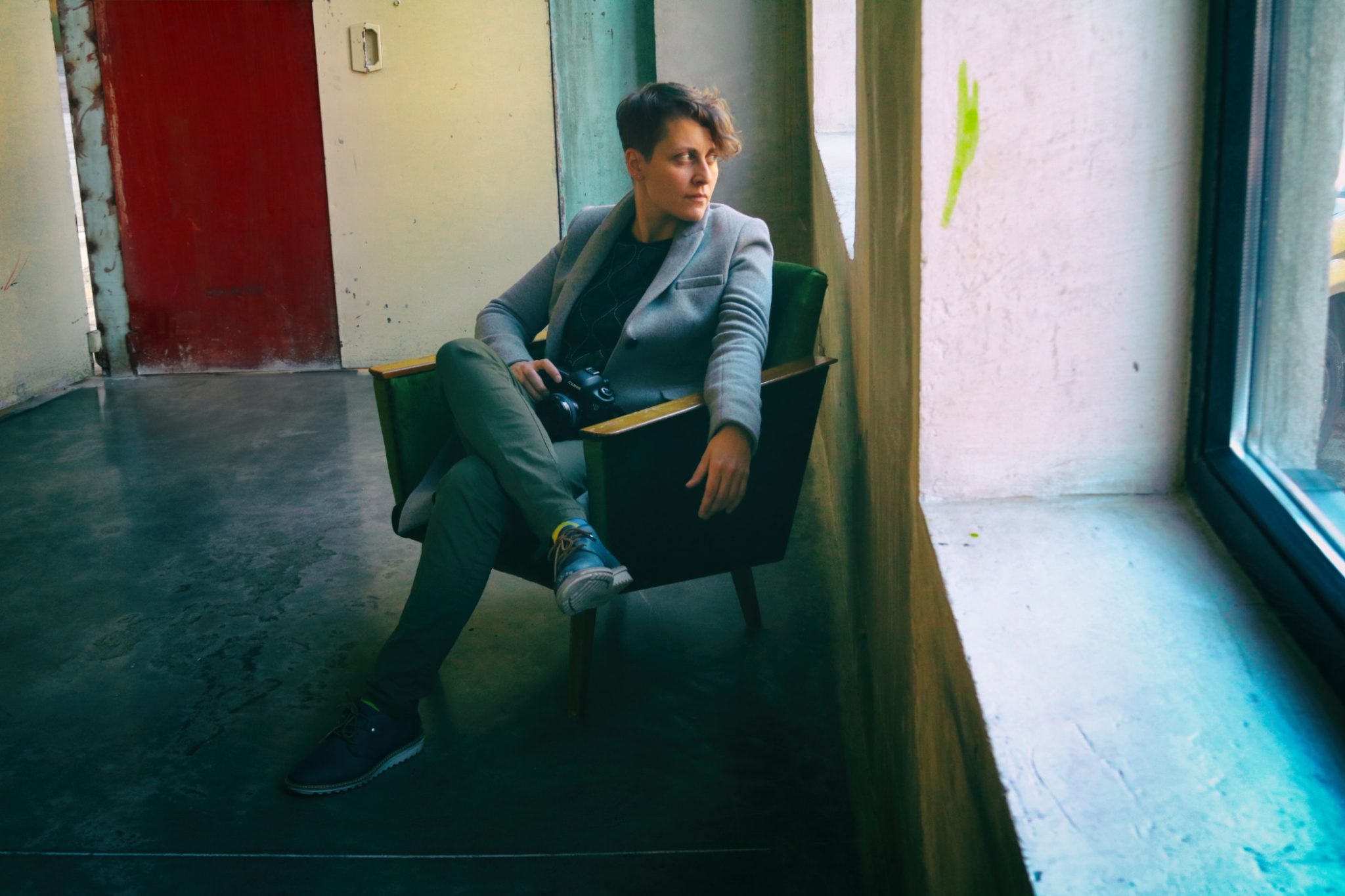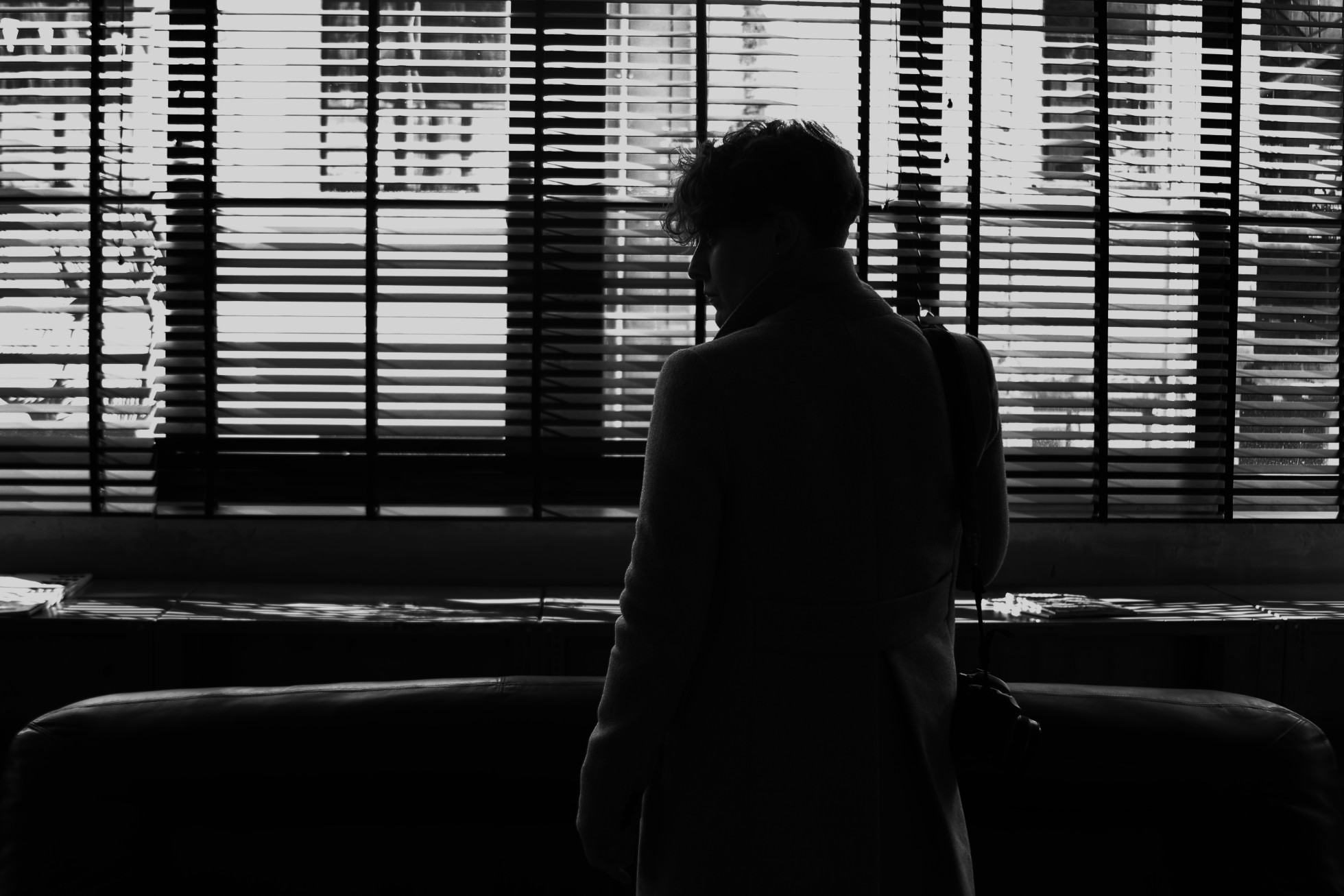Salome Sagharadze, 37, Batumi/Tbilisi
„I have always wanted to be a film director. When the film degree program was opened for the first time in the Batumi Arts Institute and they started accepting applications, somebody spread the inside information that they did not accept girls. The Institute officials apparently thought film direction was not a girly job. There was one girl willing to enroll and she was strongly advised to try film studies instead. Obviously, the first group of students consisted of boys only. After a few years, we heard that they were going to launch TV directing program. They tolerated women on TV more, and this is how I ended up in the program. My family did not resist but they did show the signs of doubt and mild mockery. My grandmother would tell me: “So, how long are you going to run around with cameras?! Get married, have a baby and then do whatever you want.” As soon as I started to earn income from this work, they recognized it as a profession. However, I know from a few girls working in the field that their families are still recommending them to switch to another area.
My male groupmates would never miss a chance to say, “Female directors suck”… I would ponder on it a lot: why aren’t female directors good enough?! Is it that they cannot tell a story? Is it that they cannot look into a camera or that they cannot read? What skill are they lacking? Ok, maybe they can’t be in a tank crew because you would need muscles for that. But in this case a director is just a decision-maker who decides which direction the plot should go and how to tell the story. Why would it need a person of a specific gender?!
At various points in my life, I have faced the stereotypical opinions that a woman should not be a sailor, a woman should not even play the saxophone and so on and so forth. And I have fought this stereotype, I have even fought against the women who think like that. There might be some female sailors around, but the idea that it is not fit for a woman, is deeply rooted in our mindset. The girls are from an early age pushed to “more appropriate professions” for them, or to being just a housewife.
Before enrolling in the directing program, I used to study tourism business. After I’d taken the last exam, my family told me that I would not be working in a hotel, it was not right for a woman. I was thinking of writing a project, bringing in tourists, building connection with hotels… and suddenly, it was not allowed! A girl from a decent background could not spend a night in a hotel and disgrace her family!

My first film was shown at a student festival. A boy on my course came up to me and told me that the film was quite good for a woman. I asked what he meant by that. He said, he thought men made better films. I’ve had to deal with such attitude on a multiple occasion. In the end, my diploma work won the Grand Prix at the student festival and one fellow student, a boy I had often quarreled with about gender issues, told me he wanted to be able to make films like me. He must have been drunk, or else he would never have admitted that. It took me four years to hear it. However, there were boys around me who thought otherwise and we made films together.
Once I had to edit a film for a competition in a private editing office where boys used to edit wedding footages. It was crowded with people and every time someone saw me at work, they looked surprise. It was as if they’d seen a woman driving a tractor. They kept asking me “Are you editing it? Wow, can you do it?” Yes, there was this mentality that a female brain cannot understand the computer. Finally, the society succeeded in convincing me that what I did was exceptional and I caught myself being surprised at seeing other women editing videos.
I did not work as a camerawoman, but I had my own camera and when male reporters could not find a free cameraman, I would accompany them to the field. It was funny to see the reaction of people expecting me to hold the microphone and the boy to hold the camera. They looked astounded. My clients still look confused when I meet them. In fact, so astonished are they that they find me surreal, someone with superpowers. As time goes by, however, things change, but we still have not opened our minds, and are still bound by stereotypes.
Let me quote one student, who put it really well: to make a film, you have to stay in the streets 24 hours, because you have to find an actor, find the right location, the right building, even the right story… A group of women does not usually hang out in the street round the clock. Actually, we are not even allowed to do that. That is why, if you go to the street you are violating a major patriarchal rule and have to hear the questions like “why are you out in the street all the time, what are you doing there?!” It is ok for the boys to hang around outside, and when one of them decides to do something, such as gather a crew, he has a whole group of people readily available for it. I have often heard that they prefer boys in a crew, because the boys will stay overnight in the studio, if needed, unlike women who are not ethically permitted to do that. If you want men to accept you in their team, you are told “make a film that’s better than mine”, but what if my film is only as good as yours? Do you mean that a female filmmaker of your level has no right to exist? You have to be better than him to be recognized. You have to be an astronaut to be allowed to drive a car. In short, a close-knit group of people makes films and barriers of entry for women are extremely high, as you cannot be in outside 24 hours a day, moreover if you are married or have a patriarchal family.
At one point, we were filming a music video in a mountainous region and the whole village gathered to watch us. Men approached us and lay on the field nearby, women did not dare come close and peered at us from their yards even though we were doing a completely innocent scene – filming children dancing. I noticed them by chance and suggested coming closer to have a better look. As if taking permission from one another, they moved together. They united, so to speak. Not a single woman had plucked up the courage to move forward alone towards us. In the meantime, their husbands and brothers sprawled on the meadow observing the performance.
Ten years ago, I moved cities, and arrived in Tbilisi. From a well-established group in Batumi, I had to start from scratch in Tbilisi. The boys who had been my fellow students and old friends were usually willing to work with me, but I struggled to find new male friends. You, as a woman of a certain age, are under rigorous control. I was left to myself here. Women are few and far between in this field and we have to really try to find one another. If you look at the recent trend, men feast in the restaurants without women, and women drink coffee without men. Mixed gatherings are very rare at the supra (Georgian feast), while everything starts and ends with a supra in Georgia.
 They even say that being a film director or a camera operator entails physical work and you, as a woman, should not be roaming streets in the cold. Every time I hear that, I recall the 90s, when we washed clothes in freezing water under the snow. So, that was ok, but holding a camera is not ok, right? Or when women work stooped over in vegetable gardens in the villages from dawn till night, is anyone worried about their health, or the work being too hard for them?!
They even say that being a film director or a camera operator entails physical work and you, as a woman, should not be roaming streets in the cold. Every time I hear that, I recall the 90s, when we washed clothes in freezing water under the snow. So, that was ok, but holding a camera is not ok, right? Or when women work stooped over in vegetable gardens in the villages from dawn till night, is anyone worried about their health, or the work being too hard for them?!
I found out that most of my clients are women. When a man hired me as a camera operator, I was taken aback a little. It was Dato Kemkhadze, a director. He called me to say that he was going to film a convent (nunnery) and needed a female operator. I had an advantage because I was a woman. Otherwise, I would have been easily replaced by a male camera operator from his circle. In the end, the film turned out so good that it won a major prize at an international festival. Since then, Dato has always called me when he needs a camera operator.
I don’t want to generalize too much, but men often try to prove their superiority. I used to work with a male photographer. We were both hired simultaneously and interviewed together by the organizer. During the shooting, we met a few times at the filming location and every time he would tell me: “Thank you for helping me out here!” Why was I helping HIM, we were both paid equally, I was doing my task, he was doing his. At last, I’d had enough and told him maybe he was helping me, not otherwise. He did not expect that and said that was probably true as well. Because of that, I doubled my effort to send a better material than he would send to the client company.
Being a woman, I do not have my say even in my work, even though, due to a repressive culture, I have struggled relentlessly to achieve some level of freedom. Because of this culture, I always try to stay modest, for example, I try not to show a naked body, not to shoot an erotic scene in my film. I always have to worry about how they will see it, considering that it comes from a woman, and it is an obstacle in my career.
If you are born a girl in Georgia, you lose touch with the actual life, except for what’s happening at home, between the walls. But what could possibly happen in the kitchen? Just imagine, you are studying filmmaking and you have not had a meaningful experience in real life. I remember the first shooting script I wanted to do was about a woman who is gazing at a whitewashed empty wall and as soon as she goes outside everyone is trying to drive her back in, telling her to “go home”. And what was going on outside at the time? Rallies, insurgency, flags flying… “What is the film’s message?!” – the lecturers asked us. I only meant to say that I was staring at a whitewashed wall while the world outside was falling to pieces.
I usually start telling my stories with “I was on a filming location once, and…” because if not a filming location, where can I be? Nowhere! I have been to the mountaintops and in the deep mines below waters. Will a woman ever go there?! But a man can get there any time he wants. He will end up there by chance or go there with a mate, or plan a trip there. No one will try to stop him, unless it’s a protected or private area. No one will be surprised to find him there. Women don’t do the things they are discouraged from doing, and they are discouraged to do anything that’s associated with socializing, going outside, being free. I was very restricted before starting this profession only because I was a woman. I was frowned upon as a single young girl and I was frowned upon as a married woman.
Sometimes, I meet women who do not believe that they are victims of psychological abuse. They say they’ve never had problems, from the professional standpoint at least. I tell them that even if nobody grabbed the camera off my hands, I have continuously faced challenges. Frequently, I have lost confidence in myself and trust in my talent. But I did my best and I continue doing what I’ve always wanted to do.”

